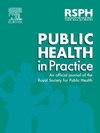Female genital schistosomiasis in Ghana: An exploration of knowledge, attitudes, and practice among women of reproductive age
IF 1.9
Q2 PUBLIC, ENVIRONMENTAL & OCCUPATIONAL HEALTH
引用次数: 0
Abstract
Objective
Female genital schistosomiasis (FGS) affects about 11 % of women of reproductive age in Ghana. The disease remains insignificant and poorly understood in endemic communities and healthcare professionals across Sub-Saharan Africa. The objective was to assess the knowledge, attitudes, and practices among women of reproductive age towards FGS.
Study design
A cross-sectional design based on mixed-method approach was conducted in two schistosomiasis endemic districts in Ghana, Lower Manya-Krobo and Shai Osudoku districts.
Methods
The study surveyed 856 women of reproductive age and conducted focused group discussions with 88 opinion leaders, adolescent girls, and women of reproductive age in 20 communities along the Volta Lake. A descriptive analysis, Chi-square test, and inferential statistics were employed on the survey data using STATA SE-18, while thematic analysis was used for the qualitative content using NVivo 20.
Results
The findings revealed that many of the participants had poor knowledge, attitudes, and practices related to FGS, with the Lower Manya-Krobo exhibiting slightly worse scores than Shai Osudoku. Only 17.9 % had heard of FGS before among the 856 participants, and factors such as age above 40 years (AOR6.91, 95 %CI:1.98, 11.84, p < 0.00), 6–10 years stay in community (AOR3.22, 95 %CI:0.49, 5.94, p < 0.00), farmers (AOR9.69, 95 %CI:6.23, 13.17, p < 0.00) statistically predicted knowledge in SOD. Compared to LMK, all age groups, farmers (AOR15.95, 95 %CI:11.72, 20.24, p < 0.00), and heard of FGS (AOR-5.42, 95 %CI: 8.51, −2.34, p < 0.00) influenced their knowledge, attitudes, and practices. The poor knowledge, attitudes, and practices and financial constraints were major barriers that led to self-treatment and delay in seeking care from hospitals.
Conclusion
The study highlighted significant gaps in KAP towards FGS among women in LMK and SOD districts. These findings reflect broader challenges observed in other schistosomiasis-endemic regions, where inadequate education, financial barriers, and limited healthcare infrastructure hinder the effective management of FGS. Addressing these gaps is crucial to improving reproductive health issues and calls for enhanced community-based health education, improved healthcare facility capabilities and resources, training healthcare professionals, and the development of context-specific strategies to address the identified gaps to improve FGS case reporting and management.
加纳女性生殖器血吸虫病:对育龄妇女的知识、态度和实践的探索
在加纳,女性生殖器血吸虫病(FGS)影响了约11%的育龄妇女。在撒哈拉以南非洲的流行社区和卫生保健专业人员中,这种疾病仍然是微不足道的,而且了解很少。目的是评估育龄妇女对FGS的知识、态度和做法。研究设计采用基于混合方法的横断面设计,在加纳的两个血吸虫病流行区,即Lower Manya-Krobo区和Shai Osudoku区进行。方法调查了Volta湖沿岸20个社区的856名育龄妇女,并对88名意见领袖、青春期少女和育龄妇女进行了焦点小组讨论。调查资料采用STATA SE-18进行描述性分析、卡方检验和推理统计,定性内容采用NVivo 20进行专题分析。结果调查结果显示,许多参与者对FGS的知识、态度和实践都很差,Lower Manya-Krobo的得分略低于Shai Osudoku。在856名参与者中,只有17.9%的人以前听说过FGS,而年龄大于40岁等因素(AOR6.91, 95% CI:1.98, 11.84, p <;0.00), 6-10年社区生活(or3.22, 95% CI:0.49, 5.94, p <;0.00),农民(AOR9.69, 95%置信区间CI: 6.23, 13.17, p & lt;0.00)统计学上预测SOD知识。与LMK相比,所有年龄组,农民(AOR15.95, 95% CI:11.72, 20.24, p <;0.00),听说过FGS (AOR-5.42, 95% CI: 8.51, - 2.34, p <;影响了他们的知识、态度和行为。缺乏知识、态度和做法以及财政限制是导致自我治疗和延迟到医院求医的主要障碍。结论该研究突出了LMK和SOD地区妇女对FGS的KAP存在显著差异。这些发现反映了在其他血吸虫病流行地区观察到的更广泛的挑战,在这些地区,教育不足、财政障碍和有限的卫生保健基础设施阻碍了对血吸虫病的有效管理。解决这些差距对于改善生殖健康问题至关重要,因此需要加强社区保健教育,改善保健设施的能力和资源,培训保健专业人员,并制定针对具体情况的战略,以解决已确定的差距,以改进FGS病例报告和管理。
本文章由计算机程序翻译,如有差异,请以英文原文为准。
求助全文
约1分钟内获得全文
求助全文

 求助内容:
求助内容: 应助结果提醒方式:
应助结果提醒方式:


